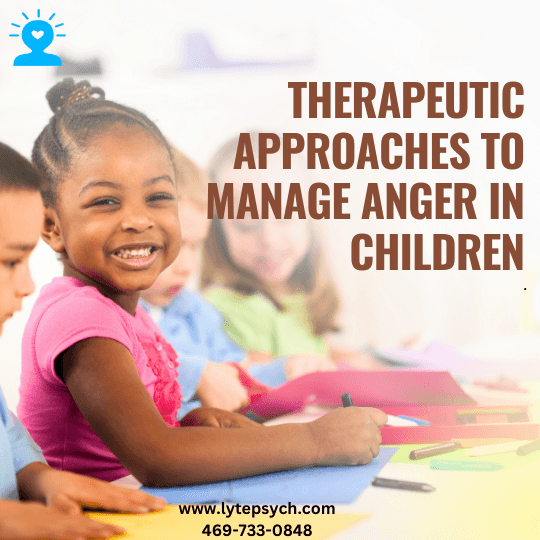Fri Apr 26 2024
Therapeutic Approaches Available at Lyte Psychiatry to Manage Anger in Children (Best Adults and Adolescents Therapist and Psychiatrist) Affordable Psychiatrist and Therapist Near You, Dallas, Fort Worth, TX

Therapeutic Approaches Available at Lyte Psychiatry to Manage Anger in Children
At Lyte Psychiatry, we specialize in offering tailored therapeutic strategies to help children effectively manage and regulate their anger. Recognizing that each child's situation is unique, our multidisciplinary team utilizes a comprehensive approach to address the emotional challenges faced by young individuals.
This blog outlines the various treatment modalities offered and discusses the importance of timely intervention in fostering emotional regulation and resilience in children.
Understanding Childhood Anger
Anger in children can manifest through various behaviors, including irritability, tantrums, and aggression. It is essential to identify the triggers of such responses—be they academic pressures, social challenges, or family dynamics—to tailor appropriate interventions.
Cognitive Behavioral Therapy (CBT)
Cognitive Behavioral Therapy is a cornerstone of the therapeutic approaches at Lyte Psychiatry. CBT aids children in recognizing and altering negative thought patterns that contribute to anger, equipping them with healthier, constructive ways to express their emotions.
Play Therapy
Geared primarily towards younger children, play therapy offers a creative avenue for children to express their emotions and learn coping strategies within a structured environment. This method provides our therapists with insights into the children's emotional states and helps guide them toward better emotional management.
Family Therapy
Recognizing that family dynamics significantly influence a child’s emotional well-being, Lyte Psychiatry incorporates family therapy into treatment plans. This approach enhances mutual understanding among family members and fosters a supportive home environment conducive to managing anger.
Medication Management
When necessary, medication management is considered as part of an integrated approach to treat anger issues in children, particularly when these issues are symptomatic of or exacerbated by other mental health disorders.
Skills Training
Our specialists provide skills training to equip children with practical tools for anger management, including relaxation techniques, effective communication strategies, and problem-solving skills.
Environmental and Lifestyle Adjustments
Advising on lifestyle and environmental changes forms part of our holistic approach to managing anger. Such adjustments may include creating a stable routine, reducing exposure to triggers, and ensuring adequate physical activity and nutrition.
Seeking Professional Help For Your Children at Lyte Psychiatry (Best Adults and Adolescents Therapist and Psychiatrist Near You)
It is critical for parents to recognize when professional help is needed. Signs that a child might benefit from professional intervention include persistent anger, difficulty in controlling emotions, and negative impacts on social interactions or academic performance.
To Schedule an appointment. Click Here
To see our services. Click Here
Call us if you haves questions at 469-733-0848
FAQs
Q: What are the signs that my child might need professional help for anger management?
A: Persistent anger, frequent temper outbursts, physical aggression, and difficulties in school or social interactions are key indicators.
Q: How does Cognitive Behavioral Therapy help with anger management?
A: CBT helps children identify negative thought patterns that contribute to anger and teaches them to replace these with more constructive responses.
Q: Can medication be necessary for managing my child's anger?
A: In some cases, particularly when anger issues are linked with other mental health disorders, medication may be part of the treatment strategy.
Q: What role does family therapy play in managing a child's anger?
A: Family therapy addresses the dynamics within the home that might contribute to a child’s anger, improving communication and understanding among family members.